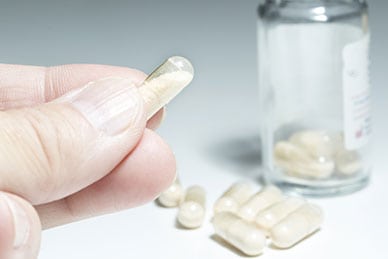The importance of maintaining balanced gut flora was one of the top health stories of 2017. We now know that having the right balance of bacteria in the gut may improve your immune system, boost your metabolism, contribute to good mental health and support good health in almost every way. Because of this news, many people have begun taking probiotic supplements or eating foods rich in beneficial bacteria. However, probiotics alone may not be enough by themselves. Prebiotics also appear to be crucial to maintaining healthy gut flora and thus may be a beneficial component when it comes to gut health.
The Benefits of a Healthy GI Tract
Probiotics have become popular health supplements, with good reason. Our bodies evolved to live symbiotically with certain types of bacteria. These bacteria colonize our skin and our intestines — basically all of the places where we are exposed to substances from the outside. Gut bacteria in particular play a very important role, boosting our immune systems, helping us absorb different nutrients and even contributing the majority of the serotonin in our bodies.
However, modern life does not contribute to a healthy GI tract. We are routinely exposed to antibiotics, anti-microbial chemicals and a variety of products that are created to kill micro-organisms. In addition, the modern Western diet lacks the fermented foods needed to continuously recolonize our systems. The result is that our bodies can easily become overrun with the wrong kind of bacteria; ones that encourage illness rather than helping to sustain good health. A proliferation of the wrong gut bacteria has been linked to a variety of diseases, including C. difficile infections, Crohn’s disease and even type 2 diabetes. Probiotics have been presented as a way of overcoming these modern challenges, but new research suggests that they are simply not enough.
Prebiotics vs. Probiotics
 Many people get confused about the different terms used in relationship to GI flora. In general, the term probiotics refers to bacteria known to have beneficial effects on our health. Prebiotics, on the other hand, are foods and substances that feed these bacteria and help them to flourish. In general, soluble fiber appears to be the key food for the bacterial species that we want to thrive. Foods that are naturally high in soluble fiber are not common in our diets, so a supplement may be helpful to many people trying to restore healthy GI flora.
Many people get confused about the different terms used in relationship to GI flora. In general, the term probiotics refers to bacteria known to have beneficial effects on our health. Prebiotics, on the other hand, are foods and substances that feed these bacteria and help them to flourish. In general, soluble fiber appears to be the key food for the bacterial species that we want to thrive. Foods that are naturally high in soluble fiber are not common in our diets, so a supplement may be helpful to many people trying to restore healthy GI flora.
When we plant a garden, we do not simply throw seeds onto the soil. Most people will provide fertilizer to help feed the growing plants. In addition, we weed and otherwise remove the unwanted plant growth in the area. Beneficial bacteria similarly need special help to thrive in an environment that is hostile due to the growth of disease-causing bacteria as well as stomach acid and other challenges.
Are You Still Taking Probiotics Alone?
Increasingly, health researchers recommend taking prebiotics along with probiotics to help support good health. In one study, researchers in Copenhagen examined people who consumed probiotic foods and supplements alone, without ingesting complementary prebiotics. These people were found to have very little differences in gut bacteria compared to people who did not take any probiotics.
Many gastrointestinal specialists feel that a lack of prebiotics is one of the major challenges to beneficial bacteria trying to colonize our system. Microbiology and pathology professor Ian Orme notes, “thirty billion Lactobacillus sounds good, but after going through the stomach acid, only about 43 of them survive… in other words these 43 or so bacteria politely ask the million or so anaerobic Bifidobacteria to please leave.” Special foods, however, can give these bacteria the advantage that they need to reproduce and thrive.
Maintaining Balanced Gut Flora
Most people in developing countries can benefit from a supplement that contains both prebiotics and probiotics. Our diet and lifestyle simply does not sustain a healthy GI tract. Researchers recommend several ways of accomplishing this. People can eat their probiotics in foods such as kefir and yogurt along with foods that are rich in soluble fiber, such as many vegetables. If this is unrealistic, as it is for many, there are supplements that contain both prebiotics and probiotics. Ideally, people should look for one that contains a high level of live bacteria: at least 20 billion. This may seem high, but our guts contain trillions of bacteria when in a healthy state. Ideally, these supplements should contain multiple strains of Lactobacillus, such as acidophilus, and Bifidobacterium, all of which contribute to good health.
Keeping healthy gut flora may be one of the greatest challenges of modern life. Our world and our food are cleaner and more germ-free than ever, which is likely a detriment to our health. Taking probiotics along with the food that they need to thrive is a healthy way to support the good health that we all need and deserve.
 For many people, winter is not a healthy season. Holiday eating, New Year’s drinking and other celebrations can take their toll. In addition, many people feel run down from winter illnesses. This can strain our body’s natural detoxifying mechanisms and lead to a variety of vague complaints, such as difficulty sleeping, digestive issues and fatigue.
For many people, winter is not a healthy season. Holiday eating, New Year’s drinking and other celebrations can take their toll. In addition, many people feel run down from winter illnesses. This can strain our body’s natural detoxifying mechanisms and lead to a variety of vague complaints, such as difficulty sleeping, digestive issues and fatigue. The indulgences of winter can be difficult on the liver and kidneys, both of which are essential for both metabolism and detoxification. Several natural strategies have been found to assist in gently boosting your body’s natural detox processes. To give your liver the boost it needs, consider one or all of the following tips:
The indulgences of winter can be difficult on the liver and kidneys, both of which are essential for both metabolism and detoxification. Several natural strategies have been found to assist in gently boosting your body’s natural detox processes. To give your liver the boost it needs, consider one or all of the following tips: Prior studies have found that people with IBS are more likely to have low vitamin D levels than the rest of the population. According to Dr. Bernard Corfe, professor at the University of Sheffield’s Department of Oncology and Metabolism, supplementing vitamin D may be key to reducing symptoms and improving quality of life. Dr. Corfe recently looked at the effects of vitamin D for IBS sufferers. His team performed
Prior studies have found that people with IBS are more likely to have low vitamin D levels than the rest of the population. According to Dr. Bernard Corfe, professor at the University of Sheffield’s Department of Oncology and Metabolism, supplementing vitamin D may be key to reducing symptoms and improving quality of life. Dr. Corfe recently looked at the effects of vitamin D for IBS sufferers. His team performed  How can fruits and vegetables protect against colorectal cancer? One of the biggest factors is their fiber content. Another study, conducted at the Dana-Farber Cancer Institute of the Harvard T.H. Chan School of Public Health in Boston, Massachusetts and published in the journal JAMA Oncology, found that a
How can fruits and vegetables protect against colorectal cancer? One of the biggest factors is their fiber content. Another study, conducted at the Dana-Farber Cancer Institute of the Harvard T.H. Chan School of Public Health in Boston, Massachusetts and published in the journal JAMA Oncology, found that a  How can gut flora affect allergies and the immune system? Researchers are still looking for root causes, but a few findings have solved part of the puzzle. Gut bacteria act as the first line of defense against any dangerous things we may ingest. They maintain an environment where
How can gut flora affect allergies and the immune system? Researchers are still looking for root causes, but a few findings have solved part of the puzzle. Gut bacteria act as the first line of defense against any dangerous things we may ingest. They maintain an environment where  The human body is teeming with other life—microorganisms inside and outside the body outnumber our one cells 10-to-one. The digestive tract, in particular, is home to a complex ecosystem of bacteria. The gut microbiome, as it is often called, has been the subject of
The human body is teeming with other life—microorganisms inside and outside the body outnumber our one cells 10-to-one. The digestive tract, in particular, is home to a complex ecosystem of bacteria. The gut microbiome, as it is often called, has been the subject of  There is a well-established link between the microbiome and eczema. Research has found that
There is a well-established link between the microbiome and eczema. Research has found that